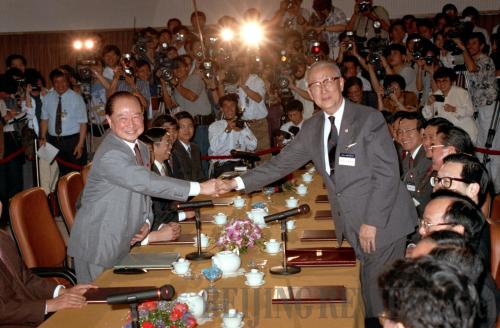|
 |
|
LONG-AWAITED HANDSHAKE: Wang Daohan (left), President of the mainland's Association for Relations Across the Taiwan Straits, meets with Koo Chen-fu, Chairman of Taiwan's Straits Exchange Foundation, in Singapore on April 27, 1993 (XINHUA) |
On April 27, 1993, Wang Daohan, President of the mainland's Association for Relations Across the Taiwan Straits (ARATS), and Koo Chen-fu, Chairman of the Taiwan-based Straits Exchange Foundation (SEF), met in Singapore.
The historic meeting laid the foundation for peaceful development of relations between the Chinese mainland and Taiwan over the last two decades.
After decades of military stalemate cross the Taiwan Straits after 1949, Taiwan authorities began to allow visitors to the Chinese mainland in 1987. This proved a catalyst for the thawing of relations between the two sides. Problems engendered by increased contact necessitated a mechanism for regular negotiations.
Founded in 1990 and 1991, respectively, the SEF and the ARATS are the non-governmental organizations authorized by Taiwan and the mainland to engage in cross-Straits talks.
Koo, a successful Taiwan-based businessman and member of the Central Standing Committee of the Kuomintang, Taiwan's ruling party, became the first chairman of the SEF when it was established in 1990. Wang, former Secretary of the Shanghai Municipal Committee of the Communist Party of China (CPC), was the first president of the ARATS.
On April 28, 1991, Chen Charng-Ven, then SEF Vice Chairman, paid his first visit to the Chinese mainland and had meetings with Tang Shubei, then Vice Minister of the Taiwan Affairs Office of the State Council. They conducted a preliminary exchange of views on issues about cross-Straits relations. During a later meeting between Chen and Wang Zhaoguo, then Minister of the Taiwan Affairs Office of the State Council, the latter called for the realization of two-way communication and direct links of mail, trade and air and shipping services across the Taiwan Straits as soon as possible. He also expressed hope that the SEF could be authorized by Taiwan authorities to conduct negotiations with its mainland counterpart. The series of talks established contact and friendship between the SEF and the ARATS and created conditions for later talks between the two organizations on affairs concerning both sides of the Taiwan Straits.
On March 30, 1992, Tang, then Executive Vice President of the ARATS, put forward that it was necessary to persist in the one-China principle in negotiations and agreements, and made relevant suggestions. Months later, on August 1, Taiwan authorities published a statement on its interpretation of the meaning of one China.
In September 1992, secretaries general of the SEF and the ARATS met in Xiamen, Fujian Province, where they exchanged unofficial opinions on the separate interpretation of the content of "one China." On December 3, 1992, the two organizations reached consensus that "both sides of the Taiwan Straits agree that there is only one China and strive to seek national reunification" and that both sides agree to put aside their difference over the political meaning of "one China." The agreement between the ARATS and the SEF to express orally and respectively that "both sides of the Taiwan Straits adhere to the 'one-China' principle," known as the "1992 consensus," has created a foundation of cooperation and mutual trust for subsequent summits between the two organizations.
From April 27 to 29, 1993, the Wang-Koo summit meeting took place in Singapore. It was the first public meeting between high-level political figures on two sides of the Taiwan Straits since 1949 in the name of non-governmental organization leaders. The meeting was conducted in a friendly atmosphere and four agreements were signed to promote trade and people-to-people exchanges.
This meeting established an institutionalized cross-Straits negotiation mechanism based on the one-China principle and practically denied Taiwan authorities' "three noes" policy, i.e. "no contact, no compromise, and no negotiation" and set up a model for equal consultation across the Taiwan Straits in the future. It also gave a strong push to cross-Straits trade and people-to people exchanges and helped people from both sides of the Straits enhance their common sense of national identity.
"The Wang-Koo meeting was successful and fruitful and signified a historic step forward for cross-Straits relations," said former General Secretary of the CPC Central Committee Jiang Zemin, during his meeting with a delegation of bankers from Taiwan on May 6, 1993.
|
